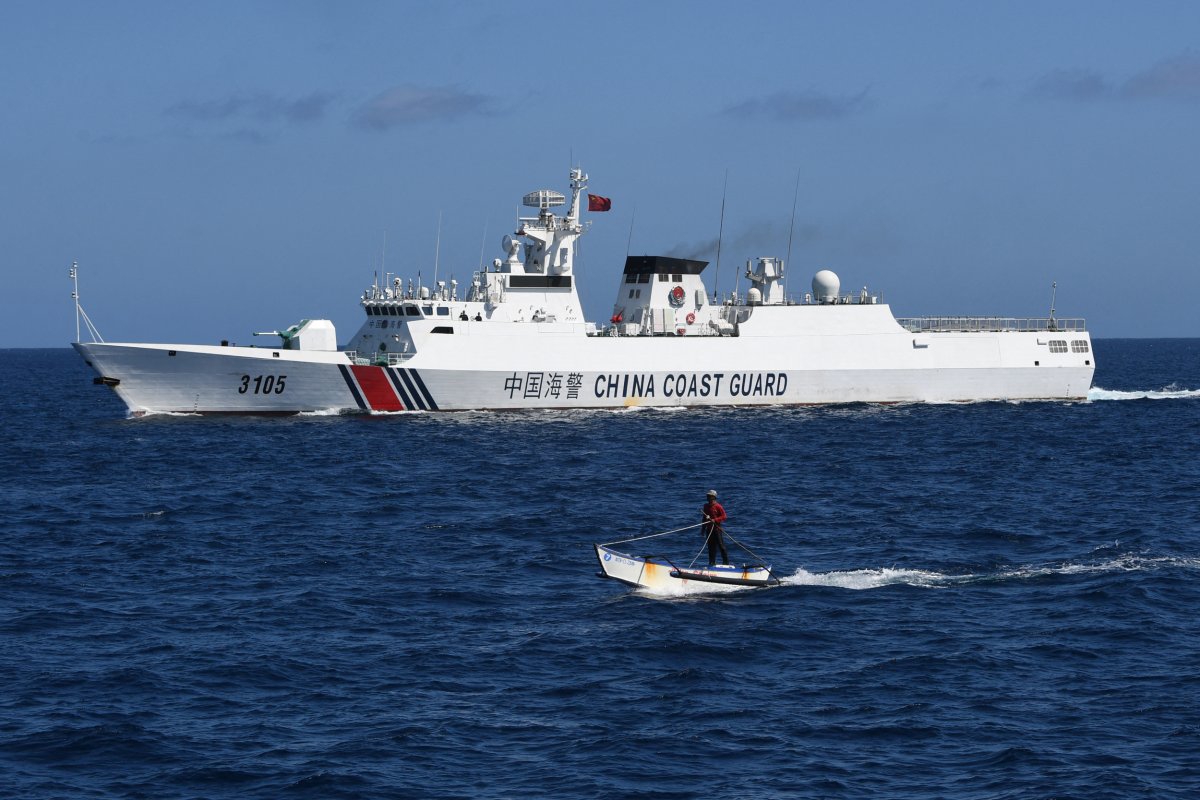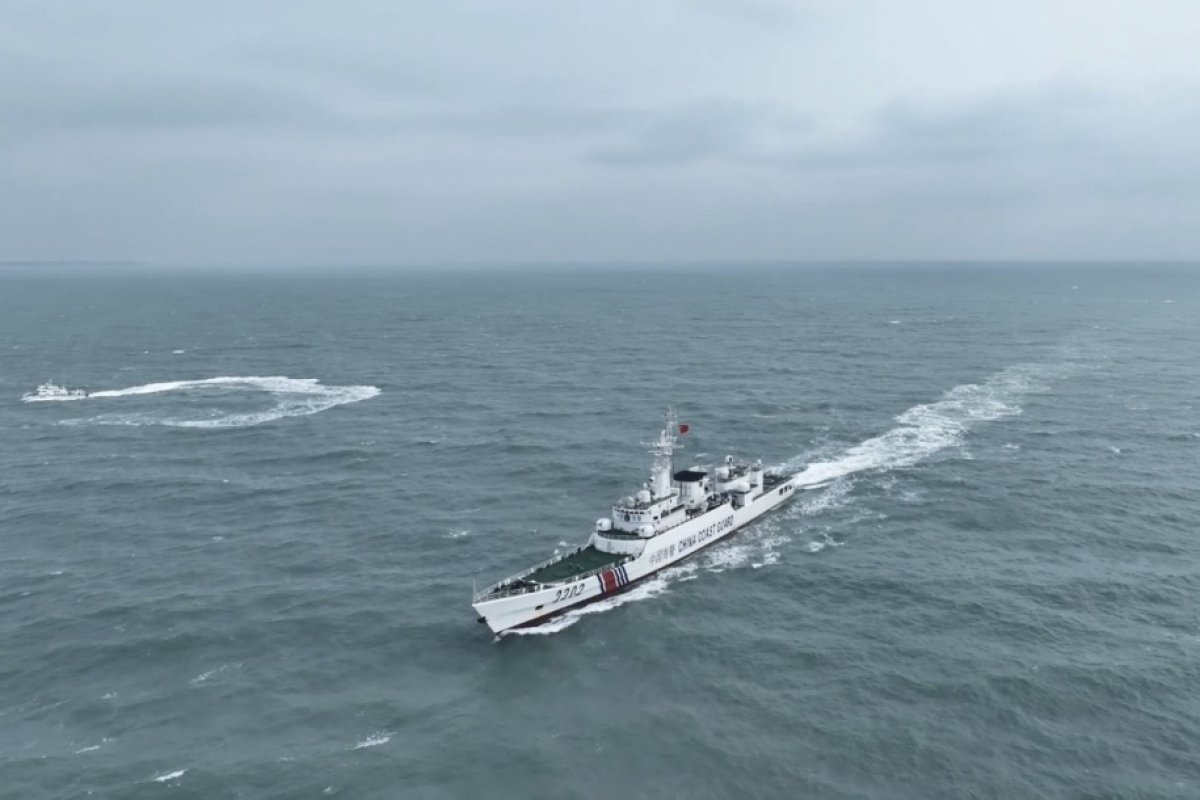In 2012, when Chinese marine surveillance vessels pushed the Philippine navy out of disputed waters in the South China Sea, Beijing learned it was possible to assert its sweeping territorial claims under the cover of enforcing domestic laws, without the help of its military.
The following year, China merged five civil maritime agencies into the unified Chinese coast guard. Since 2018, it has been under the command of the paramilitary People's Armed Police, which is itself controlled by the Central Military Commission chaired by Chinese leader Xi Jinping.
China's tactical success at Scarborough Shoal—which it effectively controls but is still is at the heart of more recent tension between Beijing and Manila—"might have been the key milestone," said Collin Koh, a maritime security expert with the S. Rajaratnam School of International Studies at Singapore's Nanyang Technological University.
The rise of the Chinese coast guard, which operates several converted People's Liberation Army ships, freed up the Chinese navy to focus on deterrence and warfighting, Koh told Newsweek. The agency also has its own distinct ship classes, which can be "up-armed in wartime," a design choice also practiced by other nations including the United States.
In a December visit to Shanghai, China's president doubled down on his expectations for his country's powerful law enforcement agency, ordering coast guard personnel to "resolutely defend China's territorial sovereignty and maritime rights and interests."

Neighboring Japan, a U.S. security treaty ally, has expressed unease about the increased powers of the Chinese coast guard, which has ramped up its patrols at the Japanese-administered Senkaku Islands, which Beijing claims as its own.
Tokyo is particularly concerned about "problematic provisions" granted under the Coast Guard Law enacted in February 2021, which it said were ambiguous as to the agency's geographical purview as well as its use of weapons.
The Chinese coast guard has no publicly available contact information. The Defense Ministry did not answer calls seeking comment.
China's coast guard vessels may be painted white, but they operate in what has been called the "gray zone," embarking on coercive activities that deliberately stop short of war. The agency's enforcement of declared national boundaries—as close as 6 miles and as far as 600 miles from the Chinese coast—poses unique policy challenges for U.S. allies and partners in Asia.
Across the region, smaller nations with limited resources often must choose between funding its navy or its coast guard. In many cases, it is not uncommon for the former service to do the job of the latter.
China, meanwhile, has leaned on the financial means and the industrial capacity to raise a coast guard that now rivals most navies. Its Zhaotou-class patrol vessel—the world's biggest armed coast guard cutter—is larger than the U.S. Navy's Arleigh Burke-class destroyer.
In the South China Sea, long-running territorial disputes between Beijing and half a dozen other capitals are coming to a head as Manila fights for access to traditional fishing grounds in its exclusive economic zone. The U.S. is treaty-bound to defend the Philippines against an "armed attack" in the waters, but the Chinese coast guard is unlikely to cross that threshold.
Coast guards are traditionally considered less threatening than their gray-hulled navy counterparts, which tend to be more heavily armed. But China is challenging that premise, observers say.
"The coast guard gives the Chinese a certain narrative that they can promote—that by using the coast guard while other parties deploy their navies, China is the one that is promoting peace and stability and avoiding escalation," Koh said.
"It has become the leading agency to spearhead China's maritime sovereignty and rights assertion. Some would argue that the use of the coast guard emboldens the Chinese to do more," he said.
Last week, China's nationalist Global Times newspaper said the country's coast guard played "a special role" in the country's territorial disputes.
By sending coast guard ships, Beijing showed that "the essence of the South China Sea issue for China is about territorial sovereignty and maritime delimitation, and China's measures are not about geopolitics or military confrontation," it quoted one expert as saying.

In the Taiwan Strait this month, the Chinese coast guard fleet began patrolling once restricted waters around the Taiwan-controlled Kinmen islands, just off China's shores, further eroding Taipei's authority and posing a fresh dilemma for the Taiwanese government.
Taiwan repeated this week that its armed forces would not intervene so both sides of the strait could "avoid war." The desire to deescalate and for proportionality means Taiwan's coast guard has the unenviable task of trying to keep China's much larger ships out of its waters.
In one striking image over the weekend, a Taiwan coast guard patrol boat was seen sailing alongside a 2,250-ton China coast guard vessel as it probed the waters around Kinmen. The Chinese ship was a former PLA Navy frigate of the Jiangwei class, according to Koh, the same type spotted off the Senkakus in the East China Sea.
China claims Taiwan as part of its territory and has refused to rule out the use of force to achieve its goal of unification. The U.S., Taipei's decades-long security partner, is urging Beijing to exercise restraint around Kinmen, but Washington has not publicly articulated how it might assist Taiwan in the latest round of tensions.
"There are no easy answers [to gray zone warfare]. China has dedicated enormous resources to making itself into the world's premier maritime power by most measures," said Tom Shugart, a senior analyst with the Center for a New American Security, a Washington think tank.
"They are now the world's largest shipbuilders, shipowners and trading nation. They have the world's largest fishing fleet by far, the world's largest coast guard, and the world's largest navy by a number of ships, if not by tonnage," Shugart told Newsweek.
"The only way to deal with that is to band together; we have to have tight alliances. Like-minded nations have to work together closely and pool their resources to come close to matching that," he said.
Uncommon Knowledge
Newsweek is committed to challenging conventional wisdom and finding connections in the search for common ground.
Newsweek is committed to challenging conventional wisdom and finding connections in the search for common ground.
About the writer
John Feng is Newsweek's contributing editor for Asia based in Taichung, Taiwan. His focus is on East Asian politics. He ... Read more
To read how Newsweek uses AI as a newsroom tool, Click here.






